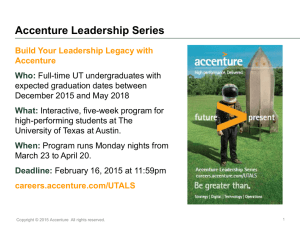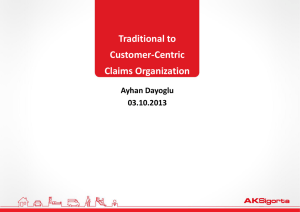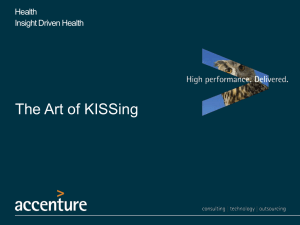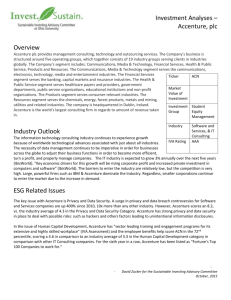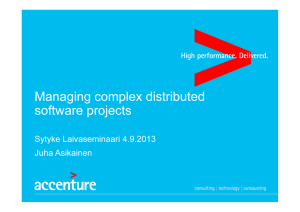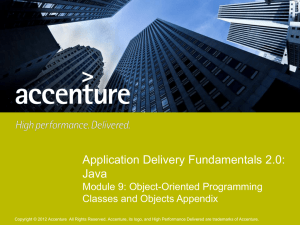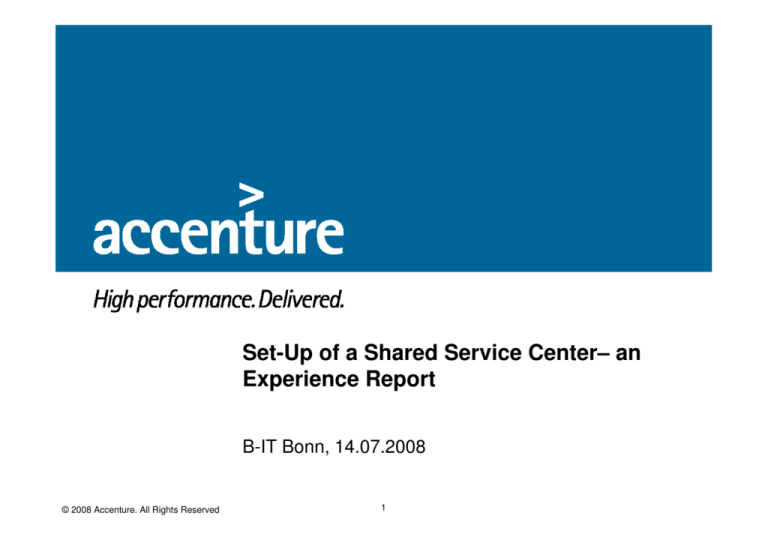
Set-Up of a Shared Service Center– an
Experience Report
B-IT Bonn, 14.07.2008
© 2008 Accenture. All Rights Reserved
1
Agenda
Accenture – the Company
Shared Service Center - Motivation
Selected Topics from a sample Project
Facing and Managing Requirements
Developing an Architecture
Assuring Quality
Wrap-Up
Q&A
© 2008 Accenture. All Rights Reserved
2
Accenture – Company Profile
Accenture Worldwide
Business Model: Global Provider of Management, Technology, and Outsourcing
Founded:
1989 (previouslyAndersen Consulting)
Clients:
91 of Fortune Global 100
> 66% of Fortune Global 500
> 4.000 clients, about 18.000 Projekte in the last 5 years
> 170.000 employees at 150 locations in 49 countries
Employees:
Stock Exchange: since July 2001 listed on the NYSE
bn. US $
24 bn. US$
Aktienkapital:
Umsatz:
CAGR: 16%
1989
2001
2007
2007
2006
2005
2004
2003
2002
2001
16,696
16,646
15,547
13,673
11,818
11,574
11,444
Accenture in Germany, Austria, and Switzerland
4.500 employees in Germany, Austria,and Switzerland
10 offices
Employees:
Locations:
© 2008 Accenture. All Rights Reserved
3
Accenture – Positioning
Global operating service-provider of management consulting,
technology, and outsourcing
Integrated services throughout the whole value chain –
from the analysis and consultation of an execution to operating a
complete process area
The goal: Fast, concrete results with a long-term increase of value
Accenture helps its clients to become and stay innovative,
competitive “high performance companies”
High Performance. Delivered.
© 2008 Accenture. All Rights Reserved
4
Accenture – Internal Organization
Comm. &
High Tech
Financial
Services
Public
Services
Products
Resources
Client Service
Groups
Management Consulting
Growth
Platforms
Systems Integration & Technology
Outsourcing
Management Consulting
Systems Integration & Technology
Outsourcing
•Development of business and corporate
strategies
•Analysis of software, technologies and
processes used by our clients
•Solutions for optimizing business processes
•Development of IT-Strategies to support
processes
• Transformation, Industrialization and
Operation of business processes e.g. finance
& accounting, HR, purchasing, customer
support, etc.
•Client Support for organizational changes up
to complete transformation processes
•In-Depth industry expertise, references and
methods
•Concept and implementation of technical
architectures and overall solutions
•Design of an overall cycle for an
implementation project from a functional and
technical concept, to the development, to the
deployment (system integration)
•Worldwide network of “Solution Centers”
(‘onshore’ and ‘offshore’) and Technology
Research Centers
© 2008 Accenture. All Rights Reserved
5
•Maintenance & Support of complex
application portfolios (SAP, individual solutions
for clients)
•Worldwide network of service centers for
operating business processes
References
© 2008 Accenture. All Rights Reserved
6
Accenture‘s Employees
Characteristics of Accenture Employees
Outstanding ability to integrate in different corporate cultures, structures and
organizations
Experience in working with multi-cultural and interdisciplinary teams
Pronounced motivation to constantly learn and to continuously update their
knowledge of the latest technologies, tools and markets
Invest in the Future
Active career management by mentoring & coaching
High amount of further education investments
Information exchange through knowledge-based databases
Regular performance evaluations
Employee share program
Specific networking between colleagues and clients
Alumni-program to keep in touch which former employees
© 2008 Accenture. All Rights Reserved
7
Agenda
Accenture – the Company
Shared Service Center - Motivation
Selected Topics from a sample Project
Facing and Managing Requirements
Developing an Architecture
Assuring Quality
Wrap-Up
Q&A
© 2008 Accenture. All Rights Reserved
8
Why Shared Services?
Allow Operating Companies to Focus on Operations and Growth & Value
Initiatives
Leverage Expertise to Provide 1st Quartile Service Levels in the Respective
Area
Significant Savings
Improve Information Integrity, Quality and Accessibility
Reduce Technology Costs and Increase Flexibility
Platform for Acquisitions and Growth Strategies
© 2008 Accenture. All Rights Reserved
9
Shared Services enables high performance with a dual
focus on efficiency and effectiveness
HIGH PERFORMANCE
BUSINESS
HIGH PERFORMANCE
SHARED SERVICES
PROCESS
SERVICE
EXCELLENCE
PEOPLE
SYSTEMS
EFFICIENCY: FASTER AND CHEAPER
EFFECTIVENESS: BETTER
© 2008 Accenture. All Rights Reserved
LOWER
COST
COST
STRATEGIC
ACHIEVEMENT
HIGHER
QUALITY
INCREASED
CONTROL
CUSTOMER
SATISFACTION
BUSINESS
PARTNERSHIP
10
Major Saving Areas of a Shared Service Center for
Accounting
Locations / People
Optimized sourcing and team
structuring
Processes
Harmonization
Flexibility
Best Practice Attempt
© 2008 Accenture. All Rights Reserved
Saving
Areas
IT
One system for all accounting staff
High process automation rates
Minimal custom developments
11
Sample Set-Up of a Shared Services Project
Consultancy 1
Locations Consolidation
Consultancy 1
Data Model
and Master Data
Consultancy 2 Harmonization
Service Management
incl. Call Center
SSC
Accounting
Consultancy 1
Change
Management, Training
and People Matters Consultancy 6
Consultancy 3
IT
Consultancy 4
Consultancy 5
Process Optimization &
Harmonization
Consultancy 1
Consultancy 7
© 2008 Accenture. All Rights Reserved
Consultancy 1
12
Sample Project approach and timeline
Processes
Locations
&
employees
IT
High-level
as-is
analysis
Design of
to-be processes
AP, AR, AA, GL and
Contact Center
Analysis of
as-is location
Analysis
as-is IT
Landscape
Migration of Locations
Determination
of to-be
locations
Service Management
Conception
Design long-term IT architecture
interims &
long-term
Interim IT architecture
IT architecture Release 1 Release 2
Release n
SOX
Release of
long-term
IT architecture
Ensure SOX compliance of processes and IT
2007
© 2008 Accenture. All Rights Reserved
Realization of Quick-wins and
roll-out of to-be processes
2008
13
2010
2012
Agenda
Accenture – the Company
Shared Service Center - Motivation
Selected Topics from a sample Project
Facing and Managing Requirements
Developing an Architecture
Assuring Quality
Wrap-Up
Q&A
© 2008 Accenture. All Rights Reserved
14
Efficiency Improvement of Accounting Processes
Example: Process „Handling manual Payment Requests“
Characteristic of the Process (Actual Process)
Process allows dedicated employees to manually request a payment of an amount to their bank
without having a document
Use Case: CEO wants to buy a new company
Problems and Limitations of the Process (Actual Process)
Various different occurrences of the same process within the sub-companies
High degree of manual activities for handling the process:
Validation of request from the general ledger
Complex Negotiations between general ledger and functional units
Booking of request in the clearing account
Submission of request in the banking software
Feedback to the originator of the request
No single-point of entry, but many different input options (e.g. fax, phone)
Long duration of the process
For the improvement of this process (and many others) general core assumptions
have been developed
© 2008 Accenture. All Rights Reserved
15
Core Assumptions for setting up a Shared Service Center
Reduction of redundant
activities
Standardization
Harmonization
Automation
Centralization of
Corporate-wide and
Standardization and
Automated activities and
operational activities
through the merging of
identical processes into a
single location
Consolidation and
centralization of planning
and controlling activities
within the corporate
group
Erasure of manual
activities related to the
manual gathering of data
uniform processes and
guidelines
Clear assignment of
responsibilities
Standardized treatment
of identical business
transactions through
focused training of
employees
Establishing a WebPortal as the single point
of contact
harmonization of master
data
Improvement of
efficiency through
consolidation of
processes
Reduction of different
occurrences of
processes that relate to
similar circumstances
processes
Communication based
on the Web-Portal
Reduction of negotiation
processes through
automation
Automated generation
and provision of reports
of key performance
indicators
© 2008 Accenture. All Rights Reserved
16
Applying Core Assumptions to the Payment Process
Development of New Target Process
Request
NEEDS
REVISION
Accounter
Supervisor
Originator
REQUEST
FOR
PAYMENT
Handling of authorization
request through a
Web Front End
TYPE
domestic
/
offshore
Syntactical
Validation
Authorization
Validation
SAP
Banking
interface
Request
REJECTED
• Automation of complete activities such booking and submitting
a request, syntactical validation
• Central Workflow Engine assigns activities and responsibilities
to all involved parties
Workflow Engine and Web Portal have
been identified as core components of a
target architecture
• Input of Payment Requests through a Web
Front End enabled by a Web Portal
• Reception and handling of feedback
© 2008 Accenture. All Rights Reserved
17
Applying Core Assumptions
Identifying Target Processes (“Measures”)
Task (Challenge)
Identification of inefficient accounting processes
Improvement of these processes through the development of new target processes
addressing the core assumptions
Description of these in terms of measures
Assignment to one of the pillars (Reduction, Harmonization, Standardization, Automation)
Functional description of the measures
Description of the business case
Implications for IT units
Milestone plan
In addition: identification of measures for quick win opportunities
Result
Accenture’s Contribution
In 2007 / 2008, approx. 250 measures were
identified
Set-Up of requirements management
process (measure process)
Continuous tracking of measures become a
crucial project activity
Support during the identification and
refinement of measures
Refinement of measures (functional and
technical specifications
Prioritization of measures
© 2008 Accenture. All Rights Reserved
18
Accenture‘s Task: Management of Requirements
Accenture’s Task
Development and deployment of a solid process model for managing requirements
Short-term approach: management of new requirements (“measures”) from the idea to go-live
Long-term approach: management of all kind of requirements (e.g. change requests,
requirements of backend systems)
Challenges
Many different sources for requirements often lead to an unclear picture
Many different stakeholders:
Business units
Technical units (IT)
External sub companies (owner of backend systems)
Other units of the companies (e.g. work council, financial auditor)
Project lead
Many organizational restrictions and regulations (frozen zones, SOX)
No clear process for the acceptance and commitment to requirements and all follow-up
documents (e.g. requirements specification, technical design, test cases)
© 2008 Accenture. All Rights Reserved
19
Developing a Process of Requirements Management Based
on Accenture Delivery Methods (ADM)
Approach
Usage of Accenture Delivery Methods (ADM) providing well-proven activities, inputs, deliverables and
roles within each activity during the Requirements Plan and Analysis Phases
Accenture Delivery Methods for Custom Development
Primary
Deliverables
Primary Inputs
PG239 –
Project
Statement of
Work
PG081Stakeholder Goals
and Expectations
PL101 Requirements
PL 123 - Current
Capability
Assessment
AP 221 - Use Case
AP 235 - User
Scenario
Transition Point Design
Transition criteria
Quality check
© 2008 Accenture. All Rights Reserved
PL 201 Requirements
Traceability Matrix
20
Process of Managing Requirements from the Idea to Go-live
Short-time Solution
© 2008 Accenture. All Rights Reserved
21
Process of Managing Requirements from the Idea to Go-live
Short-time Solution
Plan
Analyze
Design
Build, Test, Deploy
Permament Activities
(Configuration Audits)
© 2008 Accenture. All Rights Reserved
22
Process of managing Requirements from the Idea to Go-live
Long-term Solution
New Requirements
Change Request
for a Baseline
Change Request
to / from
subcompanies and
partner projects
All other
requirements
Single point of entry (Sharepoint tool)
Central maintenance of all requirements in a shared repository
Monitoring of all requirements from the idea to Go-Live by the
requirements management team
Design and implementation of requirements by expert teams
© 2008 Accenture. All Rights Reserved
23
Agenda
Accenture – the Company
Shared Service Center - Motivation
Selected Topics from a sample Project
Facing and Managing Requirements
Developing an Architecture
Assuring Quality
Wrap-Up
Q&A
© 2008 Accenture. All Rights Reserved
24
Set-Up of an Architecture as a Basis for the Implementation
of Target Processes (Measures)
Accenture‘s Task
•
•
Task: Design and set-up of an architecture as a basis for the implementation of target processes
Approach: Usage of Accenture Delivery Methods (ADM) providing well-proven activities, inputs,
deliverables and roles within each activity during analysis and design of a technical architecture
Accenture Delivery Methods for Custom Development
Primary Inputs
PL101 Requirements
TA 223 –
Application
Architecture
Specification
PL 123 Current
Capability
Assessment
TA 230 – Technical
Architecture
SpecificationTrace
ability Matrix
AP 221 - Use
Case
Transition Point Design
Transition criteria
Quality check
© 2008 Accenture. All Rights Reserved
Primary
Deliverables
25
The Architecture – The Big Picture
(Web) Frontend
Business
Developer
Accounter
Manager
Core Layer
Portal Component
SSO
Personalized Activity List
Middleware Component
Workflows
BI
Component
KPIs
e.g. Payment Request
Backend-Systems
of Subcompanies
SAP-System
R/3
Other internal
Systems
SAP-System
R/3
FI
© 2008 Accenture. All Rights Reserved
SAP-System
R/3
SAP-System
R/3
FI
FI
26
FI
External
Services
Portal Component
Goals
Standardized front-end for stakeholders for using well-defined accounting processes
Single-Sign-On (SSO) functionality for the integration of backend-systems
Personalized activity list allows a structured processing of workflow activities
User interfaces comply with corporate identity guidelines
Definition of a substitute person for a workflow activity
Challenges
Technical Aspects
Problems with the integration of interfaces
from the backend systems
Portal based on SAP Netweaver Portal 6.0
ARIS-based modeling of user interfaces
(together with the accounting processes)
Dealing with unclear requirements from the
client:
For some processes no specification of
user interfaces were given
Imprecise specification of input fields
Insufficient resources
© 2008 Accenture. All Rights Reserved
27
Middleware Component
Goals
Provision of a workflow engine for the deployment of accounting workflows
Integration of various SAP-backend systems of the sub companies
Accounting transactions still reside within the original backend systems (SAP / FI)
Synchronization of master data between middleware and backend systems
Better maintenance of workflows
Challenges
Technical Aspects
Problems with the integration with of
backend systems
Middleware based on Third-Party vendor
solution
Exception handling
ARIS-based modeling of workflows
Unclear mapping of master data
Remote-enabling of SAP modules
Application management
© 2008 Accenture. All Rights Reserved
28
Business Intelligence (BI) Component
Goals
Business monitoring facilities of both middleware and backend systems based on Key
Performance Indicators (KPIs)
Provision of a dashboard within the web portal for visualizing KPIs
Consolidation and visualization of financial operating data from the decentral backend systems
Challenges
Technical Issues
Problems with the integration with of
backend systems
Solution based on Third-Party vendor
solution
Synchronization of master data
Flexible, multi-dimensional analysis of
financial data
© 2008 Accenture. All Rights Reserved
29
Target Architecture (Vision)
Portal Component
SSO
Personalized Activity List
BI
Component
Middleware Component
Workflows
e.g. Payment Request
SAP
CO
KPIs
SAP
CO
Global SAP FI / CO Module
FI
SAP
CO
SAP
CO
Harmonized Master Data
© 2008 Accenture. All Rights Reserved
30
Agenda
Accenture – the Company
Shared Service Center - Motivation
Selected Topics from a sample Project
Facing and Managing Requirements
Developing an Architecture
Assuring Quality
Wrap-Up
Q&A
© 2008 Accenture. All Rights Reserved
31
Different Ways for Assuring Quality in our Projects
serves as basis for
QPI Certification
Internal program within Accenture for
assuring the quality value of our
projects
establishes
Peer Reviews
Regular Walk-through of work
products within a project assuring its
quality and reducing re-work
CMMI Certification
Industrial-wide appreciated
certification program assuring the
quality of our projects and leveraging
the reputation to our customers
Goals:
• Reduce costs of poor quality
• Usage of best practices and assets
• Certification as a requirement for defined industries and regions
© 2008 Accenture. All Rights Reserved
32
QPI Mission and Program Direction
Quality and Process Improvement (QPI) Program Mission:
To improve delivery capability and reduce execution risk by increasing the
use of delivery best practices and promoting the adoption of the Accenture
Delivery Suite across our consulting and application outsourcing
engagements.
The QPI Program is being rolled out globally to:
Industrialize the use of Accenture Delivery Methods across the complete
end-to-end delivery lifecycle.
Minimize risk of schedule delay, cost overrun and quality issues through
the effective use of methodology and industry best practices.
Support the Operating Groups in achieving Capability Maturity Model
Integration (CMMI) Level 3.
Benefits:
Reduced requirement errors and re-work
Pro-active and efficient management decisions
Promotes continuous improvement
© 2008 Accenture. All Rights Reserved
33
Necessary Actions
All projects are required to follow Accenture Delivery Methods, including:
Develop Management Plans using predefined templates:
Project Plan
Risk Management Plan
Configuration Mgmt Plan
Quality Management Plan
Project Measurement Plan
Use ADM estimating tools and document estimating assumptions
Demonstrate use / implementation of these plans
Review cost and schedule performance at least every two weeks. Take
corrective actions when not within historical thresholds
Incorporation of an external QPI liason:
Experienced and trained individual who coaches and assists project management
with processes, tools, coaching, and training.
© 2008 Accenture. All Rights Reserved
34
Overview of Quality Review
There are three types of quality reviews:
Peer Reviews
Regular Walk-through of work products
Process and Product Quality Assurance
(PPQA) Reviews
Best Practices Reviews (Process)
Performed by the QPI Liason
Quality Assurance (QA) Reviews
Performed in collaboration with client
Addresses the demands of client
© 2008 Accenture. All Rights Reserved
35
CMMI Overview / Benefits
CMMI is a framework that contains the key elements for effective
processes and best practices addressing productivity, performance,
costs, and stakeholder satisfaction.
CMMI:
Serves as a guide for organizational self-improvement
Provides an integrated view of process improvement across
multiple disciplines
For example: Software engineering and system engineering
CMMI provides:
The benefit of the industry’s prior experiences and best practices
A framework for prioritizing actions and shaping effective processes
A way to define what improvement means for your organization
A benchmark for appraising current processes and comparison of
organizations
Source: Software Engineering Institute/Carnegie Mellon University, 2001
© 2008 Accenture. All Rights Reserved
36
CMMI Staged Representation
Maturity Level Characteristics
Level
Characteristics
Process Areas
5 – Optimizing
• Improvement based on common
causes of variation
• Organizational innovation
• Causal Analysis and Resolution
• Organizational Innovation and
Deployment
4 – Quantitatively
Managed
• Quality and performance
understood and managed
statistically
• Organizational Process Performance
• Quantitative Project Management
3 - Defined
• Project specific process based on
tailored version of organizational
standards
• Process improvement coordinated
and managed
• Consistency of performance evident
across all projects
•
•
•
•
Decision Analysis and Resolution
Risk Management
Integrated Project Management + IPPD
Organizational Training
• Organizational Process
Definition + IPPD
• Organizational Process Focus
• Validation
• Verification
• Product Integration
• Technical Solution
• Requirements Development
2 - Managed
• Processes planned, documented,
performed, monitored, and
controlled
• Objectives achieved predictably
• Similar result achieved between
projects
•
•
•
•
Configuration Management
Process & Product Quality Assurance
Measurement and Analysis
Supplier Agreement Management
• Project Monitoring and Control
• Project Planning
• Requirements Management
1 - Initial
• Ad-hoc processes
• Reliance on individual heroes
• Schedule drives everything
• None
© 2008 Accenture. All Rights Reserved
37
CMMI Certification Level 3 for CHT
Overall Goal:
Achieve CMMI Level 3 for our Systems Integration (SI) and Application
Outsourcing (AO) work globally across all Accenture Operating Groups.
For Communications and High Tech (CHT), four projects were selected from
the geographical areas ASG and Nordic
Appraisal criteria: all projects need to be successfully appraised
Appraisal Framework SCAMPI v1.2:
CMMI – Development v1.2 as the reference model
Consists of a defined and structured set of team activities: interviews,
document reviews, presentations, validation activities
Provide direct and indirect evidence that process areas are established
© 2008 Accenture. All Rights Reserved
38
CMMI Certification Level 3 for CHT
• Direct evidence from process areas Configuration Management and
Requirements Management:
Configuration management tools, documentations, screenshots
Traceability matrix
Change request (CR) process, tools
Requirements Management process, tools
Audit Processes
For CMMI Level 3 Certification,
over 200 forms of evidence collected
Sign Off Sheets
within 6 weeks!
Logging Documents
Peer Reviews
Knowledge transfer
• Indirect evidence:
Emails proving the communication, negotiation, usage and distribution of relevant
information within the project
Emails providing the knowledge transfer
© 2008 Accenture. All Rights Reserved
39
Agenda
Accenture – the Company
Shared Service Center - Motivation
Selected Topics from a sample Project
Facing and Managing Requirements
Developing an Architecture
Assuring Quality
Wrap-Up
Q&A
© 2008 Accenture. All Rights Reserved
40
Wrap-Up
• The presentation aimed at demonstrating Accenture’s strength in delivering
high-quality solutions for complex application domains such as the set-up of
shared service centers
Organizational and functional support during the set-up
Requirements management
Design and implementation of a software architecture
• Quality assurance of our projects and solutions is guaranteed by means of our
well-proven best-practices framework (Accenture Delivery Methods) and
process standards (QPI, CMMI)
High Performance. Delivered.
© 2008 Accenture. All Rights Reserved
41
Contact
Hervé Bastian
Accenture GmbH
Maximilianstrasse 35
D - 80539 München
Telefon: +49 89 93081-68348
Mobile: +49 175 576 - 8348
Herve.Bastian@accenture.com
Dr. Sascha Alda
Accenture GmbH
Kaistraße 20
D-40221 Düsseldorf
Telefon: +49-221-9120-64158
Mobile: +49-175-57-64158
sascha.alda@accenture.com
© 2008 Accenture. All Rights Reserved
42
Q&A
Thank you very much for your attention!
Do you have questions?
http://www.accenture.com
© 2008 Accenture. All Rights Reserved
43

